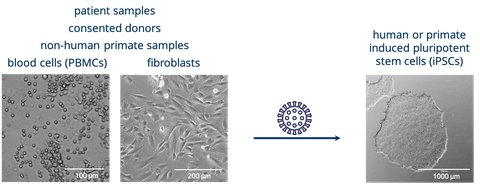Reprogramming
A variety of cell types including peripheral blood mononoclear cells (PBMCs) and fibroblasts from consented donors, patients or non-human primates can be reprogrammed to induced pluripotent stem cells using the non-integrating Sendai virus.
Samples have to be isolated and provided by the customer lab after positive approval from an ethics committee. Donor consent must include the derivation of iPSC and all downstream applications planned. A specimen text for an informed consent form can be found on the homepage of the German Stem Cell Network in German or English.
Please note that human samples should be tested negative for HIV, HBV and HCV before submitting to the facility.
As a standard the facility generates at least 12 clones per sample submitted for reprogramming and chooses 2 clones for characterization according to the customers needs and handover. More clones can be expanded and characterized upon request. If not agreed otherwise reprogramming will be under feeder-free conditions on Matrigel in ReproTeSR™ followed by transition of clones to mTeSR™1 and enzyme-free bulk passaging using ReLeSR™.
Please note: After transduction and during reprogramming and clone expansion phase, the iPSCs are treated according to biological safety level 2 (BSL-2, Germany: S2). The resulting iPSC clones loose the Sendai virus during the culture time and will be tested for absence of the virus by RT-PCR. Negative clones will be declared BSL-1 (S1) before handout to the customers. Customers require BSL-1/S1 laboratory for storing and handling the cells according to GenTSV (Gentechnik-Sicherheitsverordnung) as the iPSCs are genetically modified organisms by definition despite the lack of foreign DNA.

